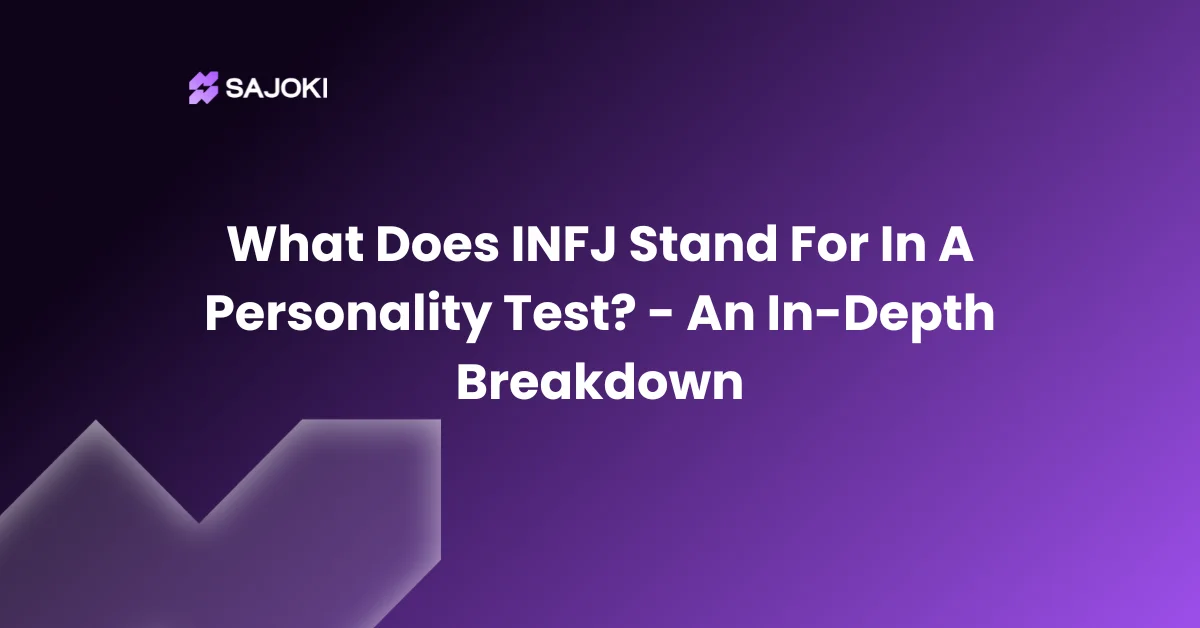If you’re new to the world of personality tests, you’ve probably come across terms such as INFJ. Well, even those familiar with personality tests seem to get these letters wrong. Surprisingly, a majority of people are unaware of what it truly represents.
So, what does INFJ stand for in a personality test?
The letters INFJ represent four personality traits, including Introverted, Intuitive, Feeling, and Judging. Together, these four traits make a rare personality type. Such as despite being introverts, these individuals are strong-willed and perceptive with high values.
Stay with us as we explore more about the term INFJ. We will talk about what these individuals are like, including their strengths, weaknesses, personal relations, and more. So, let’s jump right into it!
Where Does The Term INFJ Come From?
Before we get into what does INFJ stand for in a personality test, let’s first understand where this term comes from.
INFJ is one of the four-letter personality types used in the Myers-Briggs Type Indicator test. Such labels are used to group individuals into specific personality types.
The MBTI framework utilizes Carl Jung’s theories about individual personality and preferences.
This framework helps to sort people based on four psychological dichotomies. Thus, ultimately leading to 16 possible combinations such as INFJ.
So, to put it simply, INFJ is just one of the 16 terms used to describe in the MBTI test. Among the rest, INFJ seems to stand out the most due to its rarity and unique mix of traits.
Existing Relevant Content:
What is the purpose of the Myers-Briggs personality test?
What Does INFJ Stand For In A Personality Test?
Now let’s dive right into the question everyone has been looking for. What does INFJ stand for in a personality test? As mentioned before, it is a four-letter label to describe a personality. INFJ stands for Introverted, Intuitive, Feeling, and Judging.
Here is a breakdown of what each of these labels means in a personality.
Introverted
This goes without saying, but INFJ individuals are introverts at their core. They are a bit more reserved than any other personality type in the MBTI test. So, you would often notice them in a calm and quiet environment.
INFJs are soft-hearted people who would rather be engaged in their own thoughts. While they aren’t the top contenders for any social situation, you can still enjoy a meaningful conversation with them.
Intuitive
INFJs are all about their intuition. They tend to look for inner insights to guide them with possibilities others overlook. They’re not simply influenced by what’s right in front of them. INFJs will look for patterns, trends, or symbols in every situation possible.
This helps them understand the underlying meaning of certain situations. They can often comprehend long-term visions. Consequently, it’s easier for INFJ individuals to achieve their goals through informed decision-making.
Feeling
Another key factor about INFJ individuals is how profoundly they feel. Some would even label them as emotional in a very stereotypical manner. This is because they deeply value empathy in every situation possible.
So, when it comes to decision-making, logic isn’t their sole criterion. How INFJs do things is always affected by their principles. Moreover, they are the most likely to consider how their decisions affect others. Hence, they are also the first ones to offer help or lend a shoulder to the people around them.
Judging
People with INFJ personality types have a good sense of judgment. However, it is important to understand that they’re not judgmental. They just tend to have a good grasp of their environment.
Moreover, this judgment provides INFJs with a structure. It helps them plan and organize beforehand, which drives well-informed decisions. Additionally, they get a sense of control and even closure by preparing for well-structured and purposeful situations.
INFJ As The Advocate
INFJ individuals are also referred to as the Advocate. Based on what we discussed about each letter, you can probably take a guess why.
People with INFJ personalities reflect all the necessary traits to advocate for others. This nickname is a reflection of their innate ability to empathize, to be giving, and to care. Such personalities often strive to bring a positive change in the world.
Many believe INFJs or the Advocates have a tinge of idealism in them. What sets them beyond their idealism is their ability to make changes happen. They’re not idle, rather, they’re determined to bring their visions into reality.
INFJs are thoughtful and have a strong sense of purpose. They are strong-willed with even stronger morals. While this contradicts their introverted nature, INFJs make up for it with their kindness and sincerity.
Overall, in real life, you would notice INFJs working in sectors where they can make a big, meaningful change. They will most certainly exploit their own creativity and empathy to help others. Thus, being a true advocate.
Why is the INFJ personality type so rare?
If you were labeled an INFJ, you’re one of the rarest personality types out there. So, now the question is, why is the INFJ personality type so rare?
INFJs have an unconventional blend of personality traits. These traits typically contradict each other, yet still blend together very well. This is why the INFJ personality type is considered rare, or rather unique.
Let’s break this down a bit more, shall we?
To begin with, INFJ individuals are emotional yet logical. These don’t typically go hand-in-hand. Nonetheless, they feel every emotion with maximum intensity, but they can also regulate it properly.
The two traits that contradict more are their creativity and analytical ability. Their intuition allows them to explore and express themselves in extraordinary ways.
However, INFJs are also very analytical. They often spiral downwards, intending to make the best decision.
Moreover, despite being extremely reserved, they never back down from standing up for others. No matter the contradiction, their personality seems to be a delightful experience. Perhaps, this is why INFJs are also known as easy-going perfectionists.
Strengths And Weaknesses Of INFJs
Every personality type has its fair share of strengths and weaknesses. Let’s take a closer look at what this means for INFJ individuals.
| Pros | Cons |
|
|
|
2. Sensitive to criticism. |
|
3. Prone to physical and emotional burnout. |
Let’s now take an in-depth look at what exactly is the cause of these pros and cons.
INFJ Strengths
1. Insightful And Intuitive
An INFJ individual’s strongest asset is their intuition and the ability to be perceptive. They aren’t typically motivated by materialistic things, instead, they look for deeper meaning in everything. This allows them to understand both people and superficial situations.
2. Altruistic
INFJs are the best reflection of altruism. Their compassion knows no bounds, enabling them to go to any length for others. These individuals typically work towards the greater benefit for everyone, often being a true example of sheer generosity.
3. Organized And Determined
INFJs are confident about where they stand with their values and beliefs. They use this as motivation towards their goal. Moreover, their methods to achieve their goals are consistently efficient. In simple words, INFJs are go-getters.
INFJ Challenges
1. Hesitant To Confide In Others
INFJs aren’t really good with people skills. They socialize when the situation calls for it, however, they hardly open up to people. These individuals are not comfortable sharing their struggles. As a result, they bottle up their emotions and face the repercussions alone.
2. Can’t Handle Criticism
Another challenge that INFJs go through is handling criticism. Even if the criticism is constructive and well-intended, INFJs have a hard time dealing with it. This usually stems from their innate perfectionist tendencies.
3. Prone To Burnout
Due to their idealistic nature, INFJs are always aiming to be better. They’re overachievers who, sometimes, fail to take care of themselves. This, in addition to not being able to rely on others, puts them in great distress. Thus, making them vulnerable to constant burnout.
Career Pathway For INFJ Personalities
Even in their careers, INFJs don’t chase superficial things. They truly reflect their nickname, Advocate, when it comes to their careers. INFJs aren’t just driven by their paychecks, they look for careers that will support their values.
In addition to finding a sense of meaning in their jobs, these individuals also strive for creativity. They typically fit in careers that boost their abstract ideas, allowing them to uniquely express themselves. Above all, INFJs often aim for excellence in any job. After all, they are natural perfectionists.
However, INFJs are not made for authoritative or managerial roles. Neither can they perform under strict routines with no flexibility. They are better off with roles that offer freedom. They are very versatile and prefer a good adventure every day.
Popular INFJ career paths
- Entreprenuer
- Artist
- Actor
- Educator
- Psychologist or therapist
- Human rights advocates or activists
- Medical researcher
INFJ Relationships
Like everything else in their life, INFJs also look for a true sense of meaning in their relationships. Whether it is platonic or romantic, INFJs are compassionate and kind. More importantly, they are emotionally intelligent and grounded.
However, INFJs have a difficult time building meaningful relationships. Sometimes, their idealism and moral values provide them with unrealistic expectations. Thus, creating a barrier when connecting with people. What makes the situation worse is their introverted nature.
Nonetheless, once an INFJ individual bonds with you, they hardly let go of it. This is why you will usually see them with a close-knit group. Moreover, within this group, these individuals are incredibly understanding. They will show you the utmost respect and support you through everything.
FAQ
Q. Can INFJs be talkative?
Yes, but only with people they’re comfortable with. Otherwise, their conversations are limited to what their environment necessitates.
Q. Are INFJs good leaders?
Despite not being comfortable being in the spotlight, INFJs can sometimes be good leaders. They quietly lead with empathy and integrity, instead of authority.
Q. Who is better, INFP or INFJ?
No personality type is inherently better than the rest. They all have their strengths and weaknesses. For example, INFJs are more structured and strong-willed, whereas INFPs are more spontaneous.
Conclusion
The world of personality testing has been taken over by terms like INFJ. Now, what does INFJ stand for in a personality test? INFJ specifies four personality traits, which are Introverted, Intuitive, Feeling, and Judging.
The term comes from the personality test MBTI, where personalities are grouped into categories. INFJ individuals are headstrong when it comes to their altruism. However, contradictorily, they’re also kind-hearted introverts with a sense of belonging in small, close-knit communities.










